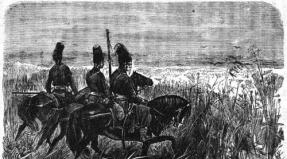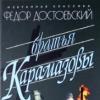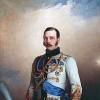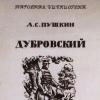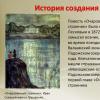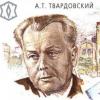Big Soviet Encyclopedia - all power advice! Encyclopedia Extension of the slogan All power advice
All power advice!
the power of the Soviets! ", the main political slogan of the Bolshevik party during the preparation and holding of the Great October Socialist Revolution. Nominated in April Tezisa V. I. Lenin and was enshrined in the decisions of the All-Russian April Conference of the RSDLP (b). The content of the slogan has changed in the process of struggle for the socialist revolution . In the period of the peaceful development of the revolution (April - June 1917), he assumed the elimination of the boulder by the transition of all the authorities to the Soviets, the creation of the Soviet government from Socialists and Mensheviks, as they constituted the majority in the councils. During this period, the Bolsheviks had to be in the government, without entering the government, To act as an opposition party to the wide masses, criticizing the inconsistency and fluctuations in small -coming parties, using the right to respond to deputies, seek the changes in the party composition of the Soviets and will ultimately create the Bolshevik Soviet government. During this period, the question of the overthrow of the bourgeois temporary government by The armed uprising was not put, because the government was supported by ESERO-Menshevian Soviets. A temporary government that did not have real strength in its disposal and held in power with the agreement with the Council could not be able to provide any serious resistance.
In the course of the development of the revolution, the masses were convinced of their own experience that the Interim Government and his supporting Soviets did not carry out their requirements. The process of constructive illusions began. The vivid indicator of this was mass demonstrations in Petrograd (April, June and July) and other cities. In July 1917, the bourgeoisie is established. The ECERO-Menshevik councils turned into impotent appendages of the bourgeois government. Under these conditions, Lenin substantiated the need for temporary removal of the slogan on the transfer of power to the Soviets, the 6th Congress of the RSDLP (b) removed the slogan "V. V.S.!". After the bioresis of the councils of both the central and many local, the content of the slogan "V. V.S.!" Changed: now he called for the struggle for the transformation of the revolutionary, Bolshevik councils to the uprising authorities against the bourgeois government, for the establishment of the dictatorship of the proletariat. Slogan "V. V. S.!" It was implemented as a result of the victory of the October Revolution. The second All-Russian Congress of the Councils of Workers and Soldiers Deputies On October 25 (November 7), 1917 took all the power in his hands and formed the Soviet Government (SNK).
Lit.: Lenin V. I., the tasks of the proletariat in our revolution, full. Cathedral cit., 5 ed., Vol. 31; His, the seventh (April) All-Russian Conference of the RSDLP (b), in the same place; His state and revolution, there, t. 33; His, one of the fundamental issues of the revolution, is there, vol. 34; CPSU in resolutions and decisions of congresses, conferences and plenums of the Central Committee, part 1, 7 ed., M., 1954, p. 332-53; Sixth Congress of the RSDLP (Bolsheviks). Protocols, M., 1958: History of the CPSU, vol. 3, kN. 1, M., 1967; Mintz I. I., History of the Great October, Vol. 2, M., 1968.
Yu. S. Tokarev.
Big Soviet Encyclopedia, BSE. 2012
See also interpretations, synonyms, the meanings of the word and what is all the power of the Soviets! In Russian in dictionaries, encyclopedias and reference books:
- Power in quote Wiki.
- POWER in the dictionary of gender studies.:
- The ability of individual individuals or members of groups to achieve certain goals and implement their interests. Power is an integral part of any human ... - POWER in the modern philosophical dictionary:
in classical philosophical concepts - a special relationship between people, the ability to exercise their will. Tradition of interpretation V. In terms of will (subjective ... - POWER in the postmodernism dictionary:
- Knowledge - see Foucault, Disposure, "Write and punish" ... - POWER in the postmodernism dictionary:
- In classical philosophical concepts - a special relationship between people, the ability to exercise their will. Tradition of interpretation V. In terms of will ... - POWER
Constituent - cm constituent power ... - POWER in the Dictionary of Economic Terms:
Judicial - see the judiciary ... - POWER in the Dictionary of Economic Terms:
Regulatory - cm Regulatory ... - POWER in the Dictionary of Economic Terms:
Public - see public power ... - POWER in the Dictionary of Economic Terms:
Representative - see a representative power ... - POWER in the Dictionary of Economic Terms:
Control - see the control power ... - POWER in the Dictionary of Economic Terms:
Executive - see executive ... - POWER in the Dictionary of Economic Terms:
Selective - cm selective power ... - POWER in the Dictionary of Economic Terms:
Legislative - SM Legislative Power ... - POWER in the Dictionary of Economic Terms:
Discretionary cm discretionary power ... - POWER in the Dictionary of Economic Terms:
- Special social relations between domination and subordination, in which the will and actions of some people, organizations prevail (dominates) over the will and ... - ALL in the brief Church Slavonic dictionary:
- everything; In all - all ... - POWER in the biblical dictionary:
- Spiritual force (Luk.4: 36). In a worldly understanding, this is subordination and suppression based on fear. The first is the divine gift ... - POWER in the main terms used in the book by A.S. Achisener criticism of historical experience:
- Specialized form of activity (as well as the aspect of many other forms of activity) aimed at organizing the reproduction of society integration primarily through ... - POWER in the big encyclopedic dictionary:
- POWER in the modern encyclopedic dictionary:
in the general sense, the ability and opportunity to have a decisive impact on the activity, the behavior of people with the help of any means - will, authoritative, ... - POWER in the encyclopedic dictionaries:
in the general sense, the ability and opportunity to have a decisive impact on the activity, the behavior of people with the help of any means - will, authoritative, ... - POWER in the encyclopedic dictionary:
,y, mn. - And, - and well. 1. The right and the possibility of disposal of someone, to subordinate to his will. Parental in. Excess authorities. Under ... - POWER in the popular intelligent encyclopedic dictionary of the Russian language:
- And, mn. -And - "She, g. 1) Only units. The right and opportunity to dictate their will, to influence others with the help of some ... - POWER in the dictionary for solving and drafting scanvords:
Press - Fourth ... - POWER in the Synonyms Dictionary Abramova:
dominion, domination, power, strength; power, powers, right (complete); Throne, kingdom. Brazda government. "Of course, the king, strong your power." Push. The whole thing ... - ALL in the dictionary of synonyms of the Russian language:
all ... - POWER in the dictionary of the Russian language of Lopatina:
power, and, mn. - And ... - POWER in the full spelling dictionary of the Russian language:
power, and, mn. - And ... - POWER in the spelling dictionary:
power, and, mn. - And ... - POWER in the dictionary of the Russian language Ozhegov:
political domination, state administration and its bodies of V. Soviets or Soviet in. Supreme in. Come to power. To be in power. ... - Power in the Dalya dictionary:
wives. right, strength and will over than, freedom of action and orders; boss; control; | bosses, boss or chiefs. Any given ... - POWER in the modern explanatory dictionary, BSE:
in the general sense, the ability and opportunity to have a decisive impact on the activity, the behavior of people with the help of any means - will, authoritative, ... - ALL
Female. R. From ... - ALL in the explanatory dictionary of the Russian language Ushakov:
(Church. MN. MN. CP. r. from the whole). Only in talk. Study. Expression: everything and everything, everything is all - see ... - POWER, in the explanatory dictionary of the Russian language Ushakov:
mN. Power, authorities, g. 1. Only units. The right and opportunity to subordinate anyone. His will, manage the actions of someone. Government. Parental ... - Great October Socialist Revolution in the Big Soviet Encyclopedia, BSE.
- Managing in the Dictionary of Economic Terms:
Organization - for Joint-Stock Law, a commercial organization, which, by decision of the General Meeting of Shareholders, can be transferred under the contract ... - Number 4.
Open Orthodox Encyclopedia "Tree". Bible. Old Testament. Numbers. Chapter 4 Chapters: 1 2 3 4 5 6 ... - Number 30. in the Orthodox Encyclopedia Tree:
Open Orthodox Encyclopedia "Tree". Bible. Old Testament. Numbers. Chapter 30 Chapter: 1 2 3 4 5 6 ... - Exhaust 35. in the Orthodox Encyclopedia Tree:
Open Orthodox Encyclopedia "Tree". Bible. Old Testament. Exodus. Chapter 35 Chapter: 1 2 3 4 5 6 ... - Ier 36. in the Orthodox Encyclopedia Tree:
Open Orthodox Encyclopedia "Tree". Bible. Old Testament. The book of the Prophet Jeremiah. Chapter 36 Chapter: 1 2 3 4 ... - Ier 25. in the Orthodox Encyclopedia Tree:
Open Orthodox Encyclopedia "Tree". Bible. Old Testament. The book of the Prophet Jeremiah. Chapter 25 Chapter: 1 2 3 4 ... - Jes 32. in the Orthodox Encyclopedia Tree:
Open Orthodox Encyclopedia "Tree". Bible. Old Testament. The book of the Prophet Ezekiel. Chapter 32 Chapter: 1 2 3 4 ... - Dan 3. in the Orthodox Encyclopedia Tree:
Open Orthodox Encyclopedia "Tree". Bible. Old Testament. The book of the Prophet Daniel. Chapter 3 Chapters: 1 2 3 4 ... - SECOND 28. in the Orthodox Encyclopedia Tree:
Open Orthodox Encyclopedia "Tree". Bible. Old Testament. Deuteronomy. Chapter 28 Chapter: 1 2 3 4 5 6 ... - Life 31. in the Orthodox Encyclopedia Tree:
Open Orthodox Encyclopedia "Tree". Bible. Old Testament. Being. Chapter 31 Chapters: 1 2 3 4 5 6 ... - 3 TsAR 7. in the Orthodox Encyclopedia Tree:
Open Orthodox Encyclopedia "Tree". Bible. Old Testament. The third book of kingdoms. Chapter 7 Chapters: 1 2 3 4 ... - 3 Tsar 15. in the Orthodox Encyclopedia Tree:
Open Orthodox Encyclopedia "Tree". Bible. Old Testament. The third book of kingdoms. Chapter 15 Chapters: 1 2 3 4 ... - 2 Riding 4. in the Orthodox Encyclopedia Tree:
Open Orthodox Encyclopedia "Tree". Bible. Old Testament. The second book of the ezr. Chapter 4 Chapters: 1 2 3 4 ... - Estonian Soviet Socialist Republic
Soviet Socialist Republic, Estonia (Eesti NSV). I. General information The Estonian SSR is formed on July 21, 1940. From August 6, 1940 in ... - Sixth Congress RSDLP (b) in the Big Soviet Encyclopedia, BSE:
the Congress of the RSDLP (B) was held on July 26 - 3 Aug. (8-16 Aug.) 1917 in Petrograd. There were 157 delegates with a decisive voice and ... - SWITZERLAND in the Big Soviet Encyclopedia, BSE:
Swiss confederation (it. Schweizerische Eidgenossenschaft, Franz. Confederation Suisse, Ital. Confederazione Svizzera). I. General information Sh. - State in Central Europe, ... - Optional course in the Big Soviet Encyclopedia, BSE:
the course, in the USSR, an optional training course, the subject studied at the request of students of universities, students of secondary special and vocational educational institutions and ... - Ukrainian Soviet Socialist Republic in the Big Soviet Encyclopedia, BSE:
Soviet Socialist Republic, Ussr (Ukrainska Radyantschka Socialictichna Publicika), Ukraine (Ukraina). I. General information of the Ukrainian SSR formed on December 25, 1917. With the creation ... - Triumphal procession of Soviet power in the Big Soviet Encyclopedia, BSE:
procession of Soviet power 1917-18, the process of establishing Soviet power in the country from October 25 (November 7), 1917 to February ... - Congress of the Soviets of the Northern Region in the Big Soviet Encyclopedia, BSE:
The Soviets of the Northern Region, conducted on the initiative of the Bolshevik Party 11-13 (24-26) of October 1917 in Petrograd. There were 94 delegates, among them 51 ... - USSR. Epoch of Socialism in the Big Soviet Encyclopedia, BSE:
socialism Great October Socialist Revolution 1917. Education of the Soviet Socialist State February Bourgeois-Democratic Revolution served as a prologue of the October Revolution. Only the Socialist Revolution ...
in the Big Soviet Encyclopedia, BSE: - COMMUNITY in the Big Soviet Encyclopedia, BSE:
in the broad value of the term, the most different generality: city communes, rural societies, earthland, religious communities, professional associations, etc. In a number of ... - Local industry in the Big Soviet Encyclopedia, BSE:
industry in the USSR, includes industrial enterprises, associations, firms, research design and construction, etc. Organizations of subordinate ministries M.P. Union republics and ...
(April) All-Russian Conference of the RSDLP (b), the first legal conference of the Bolshevik Party: held in Petrograd on April 24-29 (May 7-12) 1917. 133 attended ...
("All power advice!",)
the main political slogan of the Bolshevik Party during the preparation and holding of the Great October Socialist Revolution (see the Great October Socialist Revolution). V. I. Lenin put forward in April theses (see the April theses V. I. Lenin) and was enshrined in the decisions of the All-Russian April Conference of the RSDLP (b). The content of the slogan changed in the process of struggle for the socialist revolution. During the period of the peaceful development of the revolution (April - June 1917), he assumed the elimination of dvoevsty (see. Deliciousness) by the transition of the entire authorities to the Soviets, the creation of the Soviet government from Serc and Mensheviks, as they constituted the majority in the Councils. During this period, the Bolsheviks were supposed to not enter the government, act as an opposition party to wide masses, criticizing the inconsistency and fluctuations in small-scale parties, using the right to respond to deputies, seek the changes in the party composition of the Soviets and will ultimately create the Bolshevik Soviet government. During this period, the question of the overthrow of the bourgeois temporary government by armed uprising was not put, because the government was supported by the ECERO-Menshevian councils. A temporary government that did not have real strength in its disposal and held in power with the agreement with the Council could not be able to provide any serious resistance. In the course of the development of the revolution, the masses were convinced of their own experience that the Interim Government and his supporting Soviets did not carry out their requirements. The process of constructive illusions began. The vivid indicator of this was mass demonstrations in Petrograd (April, June and July) and other cities. In July 1917, the bourgeoisie is established. The ECERO-Menshevik councils turned into impotent appendages of the bourgeois government. Under these conditions, Lenin substantiated the need to temporarily remove the slogan on the transfer of power to the Soviets, the 6th Congress of the RSDLP (b) removed the slogan "V. at. WITH.!". After the bioresis of the councils of both the central and many local, the content of the slogan "V. at. WITH.!" Changed: now he called for the struggle for the transformation of the revolutionary, Bolshevik councils to the uprising authorities against the bourgeois government, for the establishment of the dictatorship of the proletariat. Slogan "V. at. WITH.!" It was implemented as a result of the victory of the October Revolution. The second All-Russian Congress of the Councils of Workers and Soldiers Deputies On October 25 (November 7), 1917 took all the power in his hands and formed the Soviet Government (SNK). LIT: Lenin V. I., the tasks of the proletariat in our revolution, full. Cathedral cit., 5 ed., Vol. 31; His, the seventh (April) All-Russian Conference of the RSDLP (b), in the same place; His state and revolution, there, t. 33; His, one of the fundamental issues of the revolution, is there, vol. 34; CPSU in resolutions and decisions of congresses, conferences and plenums of the Central Committee, part 1, 7 ed., M., 1954, p. 332-53; Sixth Congress of the RSDLP (Bolsheviks). Protocols, M., 1958: History of the CPSU, vol. 3, kN. 1, M., 1967; Mintz I. I., History of the Great October, Vol. 2, M., 1968. Yu. S. Tokarev.
- - Power 1 ...
Word about Igor's regiment - Dictionary directory
- - The ability to impose your will to another participant in social relations, even if you need to suppress his reluctance to submit ...
Encyclopedia of cultural studies
- - Franz. pouvoir, eng. Power. In the concept of M. Fouco as a combination of various "authorities-to know" is an irrational history of history ...
Postmodernism. Dictionary Terminos
- - - a special relationship between people, the ability to exercise their will. The tradition of interpretation V. In terms of dichotomy "Mr. - Rab" goes back to Platon and Aristotle ...
Pedagogical Terminology Dictionary
- - Under the "authorities" in the Bible implies people and institutions that carried out the management of the country ...
Biblical Encyclopedia Brockhausa
- - Specific management tool used to achieve their goals ...
Philosophical encyclopedia
- - In classical philosophical concepts - a special relationship between people, the ability to exercise their will. The tradition of interpretation V. In terms of will and dichotomy "Mr. - Rab" goes back to Platon and Aristotle ...
The newest Philosophical Dictionary
- - In classical philosophical concepts - a special relationship between people, the ability to exercise their will. The tradition of interpretation V. In terms of will and dichotomy 'Mr. - Rabs' goes back to Platon and ...
History of philosophy
- - The ability of individual individuals or members of groups to achieve certain goals and implement their interests. - An integral part of any human relationship ...
Terms of gender studies
- - the possibility or ability to influence the livelihood, the behavior of individuals and teams with the help of any means - authority, will, rights, violence and other; ...
Terminology Dictionary Librarian on socio-economic topics
- - Ability to manage, command, dispose of people, material objects, territories. Carried out through authority, words, act, actions, including coercion ...
Encyclopedic Dictionary of Constitutional Law
- - the ability to act or the ability to influence the situation or the behavior of other people ...
Dictionary of Terms of Anti-Crisis Management
- - The power is the ability to make people perform what otherwise they would not have accomplished ...
- - The main political slogan of the Bolshevik party during the preparation and holding of the Great October Socialist Revolution ...
Great Soviet Encyclopedia
- - Admission., Number of synonyms: 5 He who had a hearing listening listen to the hearing ...
Synonym dictionary
Congress. "All power advice!" Curious question: why in the moments of his victories, the Makhnovtsy invited the Bolsheviks "in power", and the Bolsheviks of Makhnovtsev - no? On the fronts of them, of course, were left by commanders, but to invite in Rev? I do not remember such a case. Well, if not
From the book one hundred and forty conversations with Molotov Author Chuev Felix IvanovichAll the power of the Soviets - Lenin advised when we meet with a request to the boss, definitely go with the paper, so that he could write a resolution, otherwise it will even be forgotten. Do not seem to you that we have significantly adjusted
From the book in the team Gorbachev: View from the inside by Medvedev Vadim.Chapter III Power - Soviets The first democratic elections: victory or defeat? - Democracy or Globlera: from the hall of the congresses of people's deputies. - Gorbachev becomes
From the book Russian gunsmiths Author Nagaev Herman DanilovichAll power advice! The war continued to hide from the sea to the sea, carrying millions of young and strong people. Russia carried the greatest damage, paying for his backwardness and poor weapons with hundreds of thousands of lives of their soldiers. To achieve a fracture in war, we needed fresh
From the book of the authorAll power to advice or government reforms? Democracy is not the power of the majority, but the protection of the minority. Albert Camus the principle of democracy, that is, the right of most to impose his decision to the minority, the principles of liberalism oppose the principles of liberalism, that is, the natural right
From the book Degtyarev Author Nagaev Herman DanilovichAll power advice! The success of the Machine Fedorov brought Degtyarev a greater joy and at the same time made him think over his invention again. "Is it really a few years of hard work in unimaginably difficult conditions disappeared for nothing? - He pondered. - Is my carbine really
From the book Artem Author Mogilevsky Boris Lvovich"All power advice!" After the elimination of the Cornilovsky rebellion, the party again put forward the slogan "All Power Soviets!". The temporary government should be overthrown, the councils should be the only form of power in the country. In Petrograd and in Moscow, Yekaterinburg, Saratov,
Bolsheviks come to power Author Rabinovich Alexander10 "All Power Soviets!" In the last, critical August days, Lenin remained in an illegal position in the capital of Finland Helsingfors. In Finland, which was part of the Russian Empire since 1809, the desire of the Finns to gain national independence
From the book a practical Russian idea Author Mukhin Yuri IgnatievichAll power advice? "The advice is born, without asking permission to power, as the struggle body, first economic, then political, and there is no other organizational form that can take away the power from presidents and parliaments. The sign of the Soviet power is
Chapter XII Power: The struggle for the power of the Bolsheviks, the power of the army, the idea of \u200b\u200bdictatorship
From the book is the wreck of power and the army. (February - September 1917) author 27. "All power to the Council!" "You ... do not allow power to leave your hands." Therefore, you will not allow the goodwill of the two or multiparty parliamentary system ... Real elections in which you could not choose. " (42) Since the class of party bureaucrats will not allow the 2008_46 (594) Author newspaper duelAccording to the Soviets of the IMF, at the presentation of the new projected-analytical report of the IMF, the head of the profile division of the research department of the Foundation Yorg Decksin was in fact that Russia was able to promote the stabilization of financial markets on
From the Book of the Summer Tribunal: Murder of the Soviet Union Author Kofanov Alexey NikolaevichAll power to the Councils of the party lost control levers, the authorities moved to the Supreme Council of the USSR. More precisely, power in a democratic understanding: as an opportunity to roar. In March 1990th III, the congress of people's deputies refrain the abolition of the sixth article of the Constitution. On the whole world Garked. AND
"All Moist Sovie there!",the main political slogan of the Bolshevik party during the preparation and conduct Great October Socialist Revolution . Put forward in April Tezisa V. I. Lenin and enshrined in the decisions of the All-Russian April Conference of the RSDLP (b). The content of the slogan changed in the process of struggle for the socialist revolution. In the period of peaceful development of the revolution (April - June 1917) he intended to eliminate dvoevlastia By the transition of all the authorities to the Soviets, the creation of the Soviet government from Serc and Mensheviks, as they constituted the majority in the Councils. During this period, the Bolsheviks were supposed to not enter the government, act as an opposition party to wide masses, criticizing the inconsistency and fluctuations in small-scale parties, using the right to respond to deputies, seek the changes in the party composition of the Soviets and will ultimately create the Bolshevik Soviet government. During this period, the question of the overthrow of the bourgeois temporary government by armed uprising was not put, because the government was supported by the ECERO-Menshevian councils. A temporary government that did not have real strength in its disposal and held in power with the agreement with the Council could not be able to provide any serious resistance.
In the course of the development of the revolution, the masses were convinced of their own experience that the Interim Government and his supporting Soviets did not carry out their requirements. The process of constructive illusions began. The vivid indicator of this was mass demonstrations in Petrograd (April, June and July) and other cities. AT july 1917. The bourgeoisie is established. The ECERO-Menshevik councils turned into impotent appendages of the bourgeois government. Under these conditions, Lenin substantiated the need to temporarily remove the slogan on the transfer of power to the Soviets, the 6th Congress of the RSDLP (b) removed the slogan "V. at. WITH.!". After the bioresis of the councils of both the central and many local, the content of the slogan "V. at. WITH.!" Changed: now he called for the struggle for the transformation of the revolutionary, Bolshevik councils to the uprising authorities against the bourgeois government, for the establishment of the dictatorship of the proletariat. Slogan "V. at. WITH.!" It was implemented as a result of the victory of the October Revolution. Second All-Russian Congress of the Councils of Workers and Soldiers Deputies On October 25 (November 7), 1917 took all the power to his hands and formed the Soviet government (SNK).
LIT: Lenin V. I., the tasks of the proletariat in our revolution, full. Cathedral cit., 5 ed., Vol. 31; His, the seventh (April) All-Russian Conference of the RSDLP (b), in the same place; His state and revolution, there, t. 33; His, one of the fundamental issues of the revolution, is there, vol. 34; CPSU in resolutions and decisions of congresses, conferences and plenums of the Central Committee, part 1, 7 ed., M., 1954, p. 332-53; Sixth Congress of the RSDLP (Bolsheviks). Protocols, M., 1958: History of the CPSU, vol. 3, kN. 1, M., 1967; Mintz I. I., History of the Great October, Vol. 2, M., 1968.
Yu. S. Tokarev.
"All power advice!"
main politics. The slogan of the Bolshevik party during the preparation and holding of the Great October Socialist. Revolution. V.I. Lenin put forward in April theses and was enshrined in the decisions of the All-Russian April Conference of the RSDLP (b). It is based on the teaching of Marxism-Leninism about the revolution and state and, in particular, on the Leninist Regulations on the Councils as a new state. The authorities of the type of Paris Commune, designed to replace the bourge layer. State Machine. The content of the slogan in the period of peaceful development of the revolution (Apr.-June 1917): the elimination of dvoevsty by the transition of the entire authorities to the Soviets, the creation of owls. Pros-Wa from Serc and Mensheviks (as they constituted the majority in the councils), the layer of the old state. The apparatus and replacement of its owls. State Org. The Bolsheviks were supposed to, without entering the pr-in, act as an opposition party and, campaigning in wide masses, criticizing the inconsistency and oscillations of small bourge. Parties, their concentration with bourgeoisie and inability to satisfy the revolution. Requirements of the people, change, using the right to revoke deputies, the party composition of the Soviets and, ultimately, to create Bolshevik owls. pr-in. At the same time overthrowing time. pr-va army. The uprising was expelled, because with the support of the Prospect of the Council, it would be perceived by the masses as an uprising against the councils. Elimination Bourges. Prospect thought to decorate the advice of the transition to them. Temporary pr-in, who did not have real strength at its disposal and held in power with the Council agreement, could not have any major resistance.
In the course of the development of the revolution, the mass was convinced of their own experience that time. Prospect and supporting his ECERO-Menshevik leadership does not carry out their requirements. The proceeding process has begun. illusions. The bright indicator of this was mass demonstrations in Petrograd (April, June and July) and other cities. In July 1917, the bourgeoisie is established. The ECERO-Menshevik tips turned into impantit appendages Bourges. pr-va. Under these conditions, V. I. Lenin substantiated the need for temporary removal of the slogan on the transfer of power to the Soviets. This, however, did not mean that the provision of the Councils as the state needed in revision. The shape of the dictatorship of the proletariat. Lenin meant only tips led by Esrami and Mensheviks. The VI Congress of the RSDLP (b) fully agreed with Lenin. During the Kornililovshchina, in the situation of a wide popular movement against counter-revolution, a number of ECERO-Men-Shevor Soviets turned out to be drawn up, for a short time, the possibility of transferring power to the Soviets. Lenin considered it quite possible these days "... Return to up-to-July demand: all the power of the Soviets, responsible for the advice of the government from the Socialists and Mensheviks" (Op., Vol. 25, p. 283). However, the ECERO-Menshevik block has its support time. Pros-Va threw this opportunity.
After the elimination of the Cornilovsky rebellion, in the conditions of a rapid bresserization of the councils reflecting the revolution. The rise of the masses, the Bolshevik party re-put the slogan "V. V.S.!", but its contents changed: now he called for the struggle for the transformation of the Soviets to the uprising authorities against the Bourges. Prospect for the establishment of the dictatorship of the proletariat. Slogan "V. V. S.!" 25 Oct was implemented. (7 Nov.), when the 2nd Alloss. Congress of the Soviets, relying on victorious army. A rebellion in Petrograd, declaring overthrow time. pr-va and the establishment of owls. authorities.
Lit.: Lenin V. I., Op., 4 ed., Vol. 24, p. 1-9, 13-14, 19-51, 116-22, 125, 181-82, 198-216, 262-64, 281-84; vol. 25, p. 157-59, 164-70, 282-87, 340-47, 385-428; t. 26, p. 38-46, 215-16; CPSU in resolutions and decisions of congresses, conferences and plenums of the Central Committee, part 1, 7 ed., M., 1954, p. 332-53; Sixth Congress of the RSDLP (Bolsheviks). Protocols, M., 1958.
Yu. S. Tokarev. Leningrad.
Soviet historical encyclopedia. - M.: Soviet Encyclopedia. Ed. E. M. Zhukov. 1973-1982 .
- ("All power advice!",) The main political slogan of the Bolshevik party during the preparation and holding of the Great October Socialist Revolution (see the Great October Socialist Revolution). Put forward in April ... ...
I Great October Socialist Revolution The first in the history of the victorious Socialist Revolution, committed in 1917 by the working class of Russia in the Union with the poorest peasantry under the leadership of the Communist Party [former ... ... Great Soviet Encyclopedia
The first in history of a victorious social revolution, committed in 1917 by the working class of Russia in the Union with the poorest peasantry under the leadership of Communist. Parties led by V. I. Lenin. As a result, V. O. s. R. The power was overthrown in Russia ...
- (CPSU) combat tested avant-garde owl. People, uniting the advanced, most conscious part of the working class, the most conscious part of the working class. Peasantry and intelligentsia of the USSR. Communist. The party was founded by V. I. Lenin as a revolution ... ... ... Soviet historical encyclopedia
- (USSR, SSR Union, Soviet Union) first in the history of socialist. State It takes an almost sixth part of the dyed land of the globe 22 million 402.2 thousand km2. In terms of population of 243.9 million people. (on Jan. 1971) owls. The union belongs to the 3rd place in ... ... Soviet historical encyclopedia
Changing power in Russia in 1917 1918 ... Wikipedia
The Great October Socialist Revolution 1917. Education of the Soviet Socialist State February Bourgeoislo Democratic Revolution served as a prologue of the October Revolution. Only the Socialist Revolution ... Great Soviet Encyclopedia
See also: Revolution 1905 1907 in Russia Change of power in Russia in 1917 1918 ... Wikipedia
Main article: Civil War in Russia Sturm of the Winter Palace. Frame from the Art Film "October" 1927. The Bolshevik regime in Russia has always tried to justify its activities with the need to create a true order of chaos anarchy ... Wikipedia
Check neutrality. On the discussion page there must be details ... Wikipedia
Books
- All power advice! . In the collection "All Power Soviets!" Faxes are reproduced by the Bolshevik newspapers of 1917. We have become a document of history, they narrate the most important events on the eve of October, introduce ...
Soviets! ", The main political slogan of the Bolshevik party during the preparation and holding of the Great October Socialist Revolution. Put forward in April theses. . Lenin and enshrined in the decisions of the All-Russian April Conference of the RSDLP (b). The content of the slogan changed in the process of struggle for the socialist revolution. During the period of peaceful development of the revolution (April - June 1917), he assumed the elimination of dvoevsty by the transition of the entire authorities to the Soviets, the creation of the Soviet government from Socialists and Mensheviks, as they constituted the majority in the Councils. During this period, the Bolsheviks were supposed to not enter the government, act as an opposition party to wide masses, criticizing the inconsistency and fluctuations in small-scale parties, using the right to respond to deputies, to seek the changes in the party membership of the Soviets and will ultimately create the Bolshevik Soviet government. During this period, the question of the overthrow of the bourgeois temporary government by armed uprising was not put, because the government was supported by the ECERO-Menshevian councils. A temporary government that did not at the disposal of real strength and held in power the agreement with the Council could not have any major resistance. In the course of the development of the revolution, the masses were convinced of their own experience that the Interim Government and his supporting Soviets did not carry out their requirements. The process of constructive illusions began. The vivid indicator of this was mass demonstrations in Petrograd (April, June and July) and other cities. In July 1917, the bourgeoisie is established. The ECERO-Menshevik councils turned into impotent appendages of the bourgeois government. Under these conditions, Lenin substantiated the need to temporarily remove the slogan on the transfer of power to the Soviets, the 6th Congress of the RSDLP (b) removed the slogan "V. at. WITH.!". After the bioresis of the councils of both the central and many local, the content of the slogan "V. at. WITH.!" Changed: now he called for the struggle for the transformation of the revolutionary, Bolshevik councils to the uprising authorities against the bourgeois government, for the establishment of the dictatorship of the proletariat. Slogan "V. at. WITH.!" It was implemented as a result of the victory of the October Revolution. The second All-Russian Congress of the Councils of Workers and Soldiers Deputies On October 25 (November 7), 1917 took all the power in his hands and formed the Soviet Government (SNK). Lit.: Lenin V. I., the tasks of the proletariat in our revolution, full. Cathedral cit., 5 ed., Vol. 31; His, the seventh (April) All-Russian Conference of the RSDLP (b), in the same place; his own


